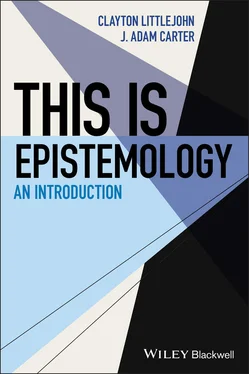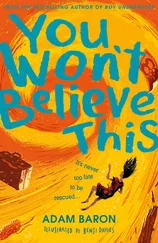1 Cover
2 Series Page THIS IS EPISTEMOLOGY Series editor: Steven D. Hales Reading philosophy can be like trying to ride a bucking bronco—you hold on for dear life while “transcendental deduction” twists you to one side, “causa sui” throws you to the other, and a 300‐word, 300‐year‐old sentence comes down on you like an iron‐shod hoof the size of a dinner plate. This Is Philosophy is the riding academy that solves these problems. Each book in the series is written by an expert who knows how to gently guide students into the subject regardless of the reader’s ability or previous level of knowledge. Their reader‐friendly prose is designed to help students find their way into the fascinating, challenging ideas that compose philosophy without simply sticking the hapless novice on the back of the bronco, as so many texts do. All the books in the series provide ample pedagogical aids, including links to free online primary sources. When students are ready to take the next step in their philosophical education, This Is Philosophy is right there with them to help them along the way. This Is Philosophy, Second edition Steven D. Hales This Is Philosophy of Mind Pete Mandik This Is Ethics Jussi Suikkanen This Is Political Philosophy Alex Tuckness and Clark Wolf This Is Business Ethics Tobey Scharding This Is Metaphysics Kris McDaniel This Is Bioethics Ruth F. Chadwick and Udo Schuklenk This Is Epistemology J. Adam Carter and Clayton Littlejohn This Is Philosophy of Religion Neil Manson Forthcoming: This Is Philosophy of Mind, 2nd edition Pete Mandik This Is Philosophy of Science Franz-Peter Griesmaier and Jeffrey A. Lockwood
3 Title Page THIS IS EPISTEMOLOGY AN INTRODUCTION J. ADAM CARTER AND CLAYTON LITTLEJOHN
4 Copyright Page This edition first published 2021 © 2021 John Wiley & Sons, Inc. All rights reserved. No part of this publication may be reproduced, stored in a retrieval system, or transmitted, in any form or by any means, electronic, mechanical, photocopying, recording or otherwise, except as permitted by law. Advice on how to obtain permission to reuse material from this title is available at http://www.wiley.com/go/permissions . The right of J. Adam Carter and Clayton Littlejohn to be identified as the authors of this work has been asserted in accordance with law. Registered Office John Wiley & Sons, Inc., 111 River Street, Hoboken, NJ 07030, USA Editorial Office 111 River Street, Hoboken, NJ 07030, USA For details of our global editorial offices, customer services, and more information about Wiley products visit us at www.wiley.com . Wiley also publishes its books in a variety of electronic formats and by print‐on‐demand. Some content that appears in standard print versions of this book may not be available in other formats. Limit of Liability/Disclaimer of Warranty While the publisher and authors have used their best efforts in preparing this work, they make no representations or warranties with respect to the accuracy or completeness of the contents of this work and specifically disclaim all warranties, including without limitation any implied warranties of merchantability or fitness for a particular purpose. No warranty may be created or extended by sales representatives, written sales materials or promotional statements for this work. The fact that an organization, website, or product is referred to in this work as a citation and/or potential source of further information does not mean that the publisher and authors endorse the information or services the organization, website, or product may provide or recommendations it may make. This work is sold with the understanding that the publisher is not engaged in rendering professional services. The advice and strategies contained herein may not be suitable for your situation. You should consult with a specialist where appropriate. Further, readers should be aware that websites listed in this work may have changed or disappeared between when this work was written and when it is read. Neither the publisher nor authors shall be liable for any loss of profit or any other commercial damages, including but not limited to special, incidental, consequential, or other damages. Library of Congress Cataloging‐in‐Publication Data is applied for 9781118336823 (Paperback) Cover design: Wiley
5 Acknowledgments ACKNOWLEDGMENTS The authors are grateful to Steven D. Hales for his encouragement, support, and patience during the completion of this book, and to three anonymous referees whose extensive comments on the initial version of the manuscript have improved the final version greatly. This Is Epistemology was written between 2014 and 2020, and the narrative arc that emerged reflects a range of epistemological topics that the authors themselves (sometimes collectively, sometimes individually) hold near and dear. The result is, we hope, a more comprehensive and apt picture of epistemology than either of us would have presented individually. Adam would like to thank those epistemologists who have shaped his own reading of the lay of the land in epistemology. There are many, but two who stand out in particular are Duncan Pritchard and Ernest Sosa. Both have been in different ways invaluable guides. In addition, Adam would like to thank Chris Kelp and Mona Simion for very helpful discussion, Clayton Littlejohn for being a great co‐author throughout, and Emma C. Gordon for years of loving support (especially during the chapter on the a priori, which was trying for us both). Clayton would like to thank his students, colleagues, and former teachers for philosophical conversation, Steven Hales for encouragement, and Amy Revier for her support. He also wants to thank his co‐author for his excellent work on this project.
6 Introduction INTRODUCTION
I.1 What Is Epistemology? I.2 Overview of the Book's Themes Free Internet Resources
7 1 THE REGRESS PROBLEM 1.1 Introduction: A Thought Experiment 1.2 Infinitism and the Regress Problem 1.3 Objections to Infinitism 1.4 Coherentism 1.5 Foundationalism 1.6 Objections to Foundationalism 1.7 Conclusion Free Internet Resources
8 2 PERCEPTION2.1 Introduction 2.2 How to Stop an Epistemic Regress 2.3 How to Talk about Experience 2.4 Are We Ever Directly Aware of External Objects? 2.5 Against Naïve Realism 2.6 Evaluating Indirect Realism 2.7 The Return of Direct Realism 2.8 Does Experience Provide Us with Reasons to Believe? 2.9 Conclusion: Choosing a View Free Internet Resources
9 3 THE A PRIORI3.1 Introduction 3.2 Negative Characterizations of A Priori Justification 3.3 In What Sense Is A Priori Justification “Independent” of Experience? 3.4 Positive Characterizations of A Priori Justification 3.5 Bealer on the A Priori 3.6 BonJour on the A Priori 3.7 Is There A Priori Justification? 3.8 Quine's Attack on the Analytic–Synthetic Distinction and Its Significance 3.9 Against the Reliability of Intuitions 3.10 Rationalism and Skepticism Free Internet Resources
10 4 INFERENCE4.1 Introduction 4.2 Inference and the Scope of our Knowledge 4.3 The Problem of Induction 4.4 Solving the Problem 4.5 A Pragmatic Justification 4.6 No Justification? No Problem! 4.7 Deductive Reasoning and Closure 4.8 Against Closure 4.9 In Defense of Closure 4.10 Conclusion 4.A Appendix: When Does a Body of Evidence Justify Belief? Free Internet Resources
11 5 ON KNOWING THE TRUTH5.1 Introduction 5.2 A Simple View 5.3 Gettier's Cases 5.4 Causation? 5.5 Modal Approaches 5.6 Ability 5.7 What If There Is No Analysis? 5.8 Conclusion Free Internet Resources
12 6 MEMORY6.1 Introduction 6.2 Awareness of the Past 6.3 Memory and Knowledge 6.4 Memory and the Justification of Belief 6.5 Justifying Our Reliance on Memory 6.6 The Problem of Easy Knowledge 6.7 Conclusion Free Internet Resources
Читать дальше












